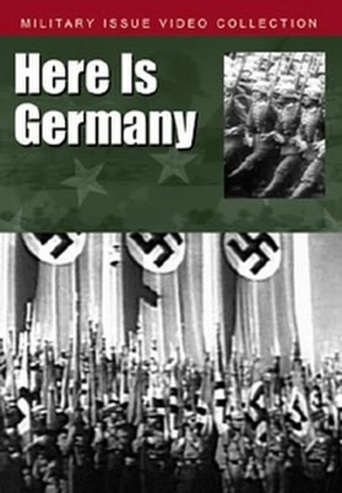drystyx
1945, and the Allies won the war. There really was no need to justify it. Even then, most people in Allied countries were patriotic.So a propaganda film served little purpose. Here, Capra tries to demonetize every German instead of the Nazis in charge. Farmers and workers in Germany had no choice, and they couldn't help anyone but themselves, or they would starve. Yet Capra in one minute will say the common German was brutal and purposely aggressive, yet in the next minute admit the common German was being used.He stresses the importance of bullying the common German. That would have made room for another Hitler to use these common Germans again. Capra is full of too many lies to forgive here. He simply doesn't place the blame where it belongs. And in doing so, he makes these common Germans susceptible to the very patriotism and liberty he claims they didn't want, and then claims they did. His hypocrisy is overwhelming.If enough common Germans in 1945 were to see this and have it translated to them, they would have turned into the very sort of freedom fighting guerrillas that armies are terrorized by. Not only poor content, but poor propaganda.
robinakaaly
Apparently intended as an instructional film for American forces of occupation, this film was never in fact used as such. It starts with a view of a peaceful, cultured, civilised and industrious society, but then rapidly switches to the atrocities committed by Germany during the Nazi period, using some of the most graphic images I've seen. In particular, several atrocities committed in Italy, France and Belgium are identified, and there is footage from the concentration camps which are mentioned but not dwelt upon: given the footage shown, there was no need for the commentary to say more. As an explanation of how Germany came to this, the film looks back over several hundred years of German history, accentuating its expansionist and aggressive tendencies. There is also comparison with the democracies of America, Britain and France to show how great powers could be civilised. To illustrate its thesis, it uses footage from films about Frederick the Great, Bismarck, the Kaiser and others: much of this was of a high quality, though sadly none of it is identified. Having set its stall, so to speak, the film analyses the period from the end of the Great War to the Rise of Nazi-ism. It points out the canard that Germans felt their army was not beaten in 1918, but stabbed in the back by democrats who then signed the oppressive Treaty of Versailles. The reaction to the Treaty then allowed the industrialists, militarists, landowners and bureaucrats to return to power, using the demagogic power of the uneducated Hitler. At this point the logic wavers somewhat, since Hitler had had a plan of his own since the early twenties. Having shown how Hitler wielded power (in the suppression of democratic institutions - and with a gruesome clip of a fallbein), re-armed and then lost the war, the film end with a peroration about not letting this happen again, and how Germans must be reformed before being let back into the comity of nations. Being 1945 when we were still just about friends with the Soviet Union, there is little mention of the known atrocities being committed by Stalin, or his equally repugnant and repressive techniques against any opposition or call for democracy. The film's analysis is open to criticism, but its general tone matches that of A J P Taylor in his Course of German History written in 1944: ie modern Germany was the result of 1,000 years of barbarism. Interestingly, much of the music played is by Mendelssohn, who being Jewish, was not actually played in Nazi Germany.
Syl
Frank Capra put together this compelling documentary about Germany as a country from it's history, culture, and ethnicity. According to the film, Germany is a country of hard-working and prosperous people who love their country, their leader, and the world. But we know better now after 66 years, Germany's leaders in the Third Reich had a diabolical plan to exterminate millions of people and propagandize the notion of superior race. You have to take the documentary's time period. 1945 was the end of World War II. The concentration camps were omitted probably only because the world had already so much to understand about this country called Germany under Hitler's reign. I can only believe that Capra would have included the concentration camps if possible. By 1945, the world was recovering and the news of the holocaust would surely shock the world again if they hadn't known the details of monstrosity and inhumanity at the hands of the German Nazis themselves. It's still worth watching to see how a country of millions can be fooled by a madman and his minions.
parsifalssister
Now 65 years old, this documentary (by Frank Capra) is a combination of history and propaganda--where the line ends or begins is beyond my limited knowledge. However, it was fascinating to watch and piece together where Germany was in 1945 and where it is today. Particularly educational were some of the words used by 3 generations of German leadership all favoring strong nationalism and expansionism whilst extolling German superiority. Two weaknesses or strengths, depending on the viewers' point of view, is no mention of the atrocities of World War II and no comparisons between Germany and other expansionist countries (including the USA). I recommend it as a piece of the past, but not to be taken on faith as either accurate or prize worthy as it paints Germany in too harsh a light.

